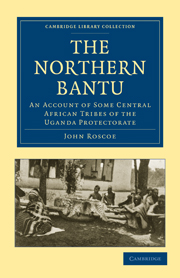Book contents
- Frontmatter
- PREFACE
- Contents
- LIST OF ILLUSTRATIONS
- Uganda and British East Africa
- PART I THE BANYORO A PASTORAL PEOPLE
- PART II THE BANYANKOLE A PASTORAL TRIBE OF ANKOLE
- PART III THE BAKENE, LAKE DWELLERS
- PART IV THE BAGESU A CANNIBAL TRIBE
- PART V THE BASOGA
- PART VI NILOTIC TRIBES. THE BATESO AND THE KAVIRONDO
- CHAP. XXIV THE BATESO AND THEIR COUNTRY, GOVERNMENT, SOCIAL CUSTOMS AND RELIGION
- CHAP. XXV THE NILOTIC KAVIRONDO AND THEIR COUNTRY, GOVERNMENT, MARRIAGE, BIRTH AND PUBERTY
- CHAP. XXVI SICKNESS, DEATH, BURIAL, WARFARE, INDUSTRIES, RELIGION AND RELATIONSHIPS
- INDEX
- PUBLICATIONS OF THE CAMBRIDGE UNIVERSITY PRESS RELATING TO AFRICA
- Plate section
CHAP. XXVI - SICKNESS, DEATH, BURIAL, WARFARE, INDUSTRIES, RELIGION AND RELATIONSHIPS
Published online by Cambridge University Press: 07 September 2011
- Frontmatter
- PREFACE
- Contents
- LIST OF ILLUSTRATIONS
- Uganda and British East Africa
- PART I THE BANYORO A PASTORAL PEOPLE
- PART II THE BANYANKOLE A PASTORAL TRIBE OF ANKOLE
- PART III THE BAKENE, LAKE DWELLERS
- PART IV THE BAGESU A CANNIBAL TRIBE
- PART V THE BASOGA
- PART VI NILOTIC TRIBES. THE BATESO AND THE KAVIRONDO
- CHAP. XXIV THE BATESO AND THEIR COUNTRY, GOVERNMENT, SOCIAL CUSTOMS AND RELIGION
- CHAP. XXV THE NILOTIC KAVIRONDO AND THEIR COUNTRY, GOVERNMENT, MARRIAGE, BIRTH AND PUBERTY
- CHAP. XXVI SICKNESS, DEATH, BURIAL, WARFARE, INDUSTRIES, RELIGION AND RELATIONSHIPS
- INDEX
- PUBLICATIONS OF THE CAMBRIDGE UNIVERSITY PRESS RELATING TO AFRICA
- Plate section
Summary
Treatment of the sick. Sickness is thought to be due to one of two causes: it may be, and the people think most frequently is, the result of magic which has been worked by some person who wishes to give pain or even to cause death because of a grievance, real or imaginary; or it may be due to some ghost. Under either circumstance, when a serious case of sickness occurs, the family seek the aid of a medicine-man who by his various tests and incantations discovers the cause; and, in a case where magic has been worked, he not only discovers the cause but also discloses the name of the culprit, who is thereupon sought and asked to give his motive for afflicting the sick person, and is paid to release him from the spell. Should the man have intended to kill the other because he has suffered some discourtesy or received some offence at his hands, he would probably have speared his shadow, so that the sick person will die unless the spell or magic is removed. Again, it may be that some magic has been worked and certain objects have been hidden near the house which are causing the sickness; these have to be removed and the spell broken before any drugs or treatment will avail the sick man. The perpetrator will only remove these when his grievance has been settled and he has received the needful compensation.
- Type
- Chapter
- Information
- The Northern BantuAn Account of Some Central African Tribes of the Uganda Protectorate, pp. 285 - 293Publisher: Cambridge University PressPrint publication year: 2010First published in: 1915

